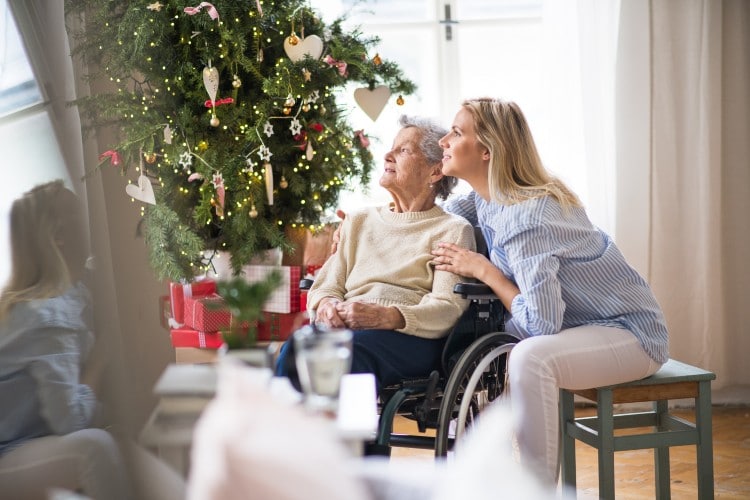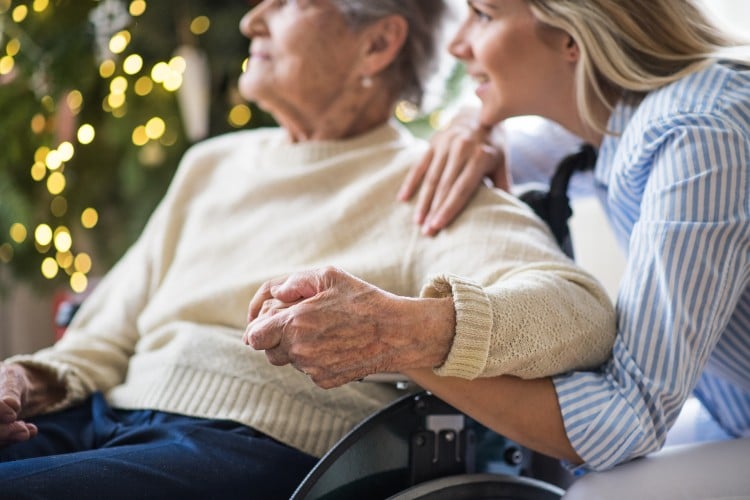Christmas can be a very exciting time for many of us. Exchanging gifts, spending quality time with your nearest and dearest and trying to make it all the way through Christmas dinner without dropping your paper hat in the gravy; it truly can be the most wonderful time of the year. Not only that, but it’s traditionally a time for hope and spreading joy; being together as a family and celebrating everything that is good in the world. But for some, Christmas isn’t always a time for joy and excitement; it can bring back painful memories of loved ones that are no longer with us, which can be particularly confusing and frightening for someone living with dementia.
We already know that Christmas is probably going to be very different for us all this year, but if your loved one has dementia, there may be a few scenarios that could make them feel a little unsettled. Here are a few small adaptations you can make this Christmas to make your festive season dementia friendly.
Decorate gradually
Transforming your home into a festive fantasy overnight may cause your loved one to feel a little confused, especially if some parts of your house are a little less recognisable. Perhaps try and put the decorations up gradually over the course of a few days and ask your loved one to help. That way, they can feel more involved and be a part of the Christmas process.

Keep food portions small
Dementia can have a big impact on appetite, which can lead to those living with dementia feeling intimidated if their plate is filled with food. Be mindful of portion sizes, and perhaps try a few vegetables and a slice of meat to start with – your loved one can always go back for seconds!
Create a safe space
Christmas activities can bring a wealth of joy and laughter, but if your loved one starts to feel a little unsettled by the noise, it may help to find a safe space for them to go and be in the quiet for a little while. If you can, try to keep a quiet room free for them, in case they become overwhelmed and need a little break.
Bring a little nostalgia
It may be that you have photographs to share from Christmases past, or perhaps you have your loved one’s favourite Christmas album on CD or available to stream. Revisiting happy memories will bring some familiarity for your loved one, subsequently helping them to feel more at ease.
Acknowledging the past
It’s also important to be open to discussing why Christmas might be particularly difficult for them if their loved ones are no longer here, or if they just don’t like Christmas in general. Gently help them remember good times with those that have passed by discussing any fond memories you have of them.

Keep them involved
Dementia can be a very lonely condition to live with, and feeling confused or unsettled in a room full of people might lead them to feel quite isolated. If you can, be mindful to involve your loved one in games and conversation; it might well be the thing that helps them to relax throughout the day.
An alternative to Christmas
Some people just don’t like Christmas, and that could be exactly how your loved one has felt all of their life before they had dementia. Why not ask them how they want to spend the day? They might not want to put up any decorations but instead just want to enjoy a cooked dinner and some peace and quiet. Be mindful that although you may love Christmas and the weeks leading up to it, it might not hold the same sentiment for them.
If you or your loved one would like additional support this Christmas, we’re here to help. Our care teams work right through the Christmas and New Year period and are available to support with hourly visits or 24-hour live-in care. Whether it’s help with getting dressed and ready for your family festivities or simply a friendly face to pop in and spend some quiet time with you, our dedicated team of carers are here to support you this Christmas. We can also support families in different areas to meet up with one another if you live a fair distance away from your loved one. Get in touch with us today to discuss your needs in more detail.
Page reviewed by Deanna Lane, Senior Clinical Lead on March 24, 2022
